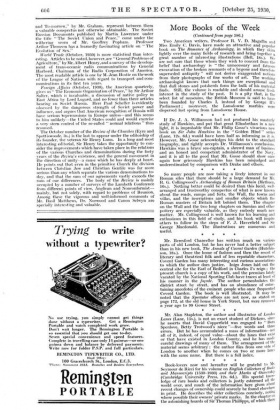The Quarterlies
THERE are at least two articles in the Round Table (September, 1930) which are indispensable for a proper understanding of the present political situation. An admirable analysis of the economic disease of the moment—falling prices, over- production, changing demand, and nationalist ambitions - shows clearly that the remedies so far proposed in the name of Imperial Economic Unity are no remedies. The Bankers' Memorandum is well described as perhaps the best available expression of ' any port in a storm. " The Dominions' objections to Empire Free Trade are obvious, but there is, if anything, more substance in the objections of Great Britain to this or any other plans for attempting to snake the British Commonwealth a closed economic area. The use of the Imperial Conference as a market for the arrangement of detailed tariff bargains is rightly deprecated. The Crisis in India" emphasises the fact that at the moment an agreed basis for discussion at the Round Table Conference does not exist, and that the finding of that basis is first and forcrilost: a problem in psychology, the limbic's' of finding common ground between experience and idealism. The moral of the article is that responsibility is the true remedy for nation- alism, in India as everywhere else. The Quarterly Review (October. 1930) is, as usual, interesting and significant only in its non-political articles. -The Music of Life " by Mr. R. W. S. Mendl and -The Stage : Yesterday, To-day
and To-morrow," by Mr. Graham, represent between them a valuable conspectus not otherwise obtainable. The Soviet Russian Documents published by Martin Lawrence under the title " The Soviet Union and Peace," come under the withering scorn of Mr. Geoffrey Popham. Professor Arthur Thomson has a learnedly fascinating article on " The Evolution of Sex."
World Trade (October, 1930) is more statistical than inter- esting. Articles to be noted, however, are "General Problems of Agriculture," by Mr. Albert Henry, and a survey of the develop- ment of trans-oceanic radio communications by General Harbord, Chainnan of the Radio Corporation of America. The most readable article is one by M. Jean Hostie on the work of the League of Nations with regard to transport and com- munications in its first ten years.
Foreign Affairs (October, 1930), the American quarterly, gives us " The Economic Organization of Peace," by Sir Arthur Salter, which is invaluable, a discussion of native policy in East Africa by Lord Lugard, and no fewer than three articles bearing on Soviet Russia. Herr Paul Seheffer is evidently obsessed by the dangerous strength of Soviet power and influence, and argues that American recognition of Russia will have serious tepercussions in Europe unless—and this seems to him unlikely—the United States could and would exercise a very stern control of the so-called " normal relations " thus resumed.
The October number of the Review of the Churches (Eyre and Spottiswoode, 3s.) is the last to appear under the editorship of its founder, the veteran Sir Henry Lunn. In a long and most interesting editorial, Sir Henry takes the ,opportunity to con- sider the improvements which have taken place in the relations of the various Churches and denominations during the forty years of the Review's existence, and the general movement in the direction of unity—a cause which he has deeply at heart. Ile points out that even in the primitive Church the division between Christian Jew and Christian Gentile was far more serious than any which separate the various denominations to- day, and that the sum of our agreements vastly exceeds the sum of our differences. The body of the Review is mainly occupied by a number of surveys of the Lambeth Conference from different points of view, Anglican and Nonconformist— mainly, but not solely, with regard to problems of Reunion. Among these the vigorous and well-informed comments of Mr. Basil Matthews, Dr. Norwood and Canon Selwyn are specially interesting and valuable.



















































 Previous page
Previous page